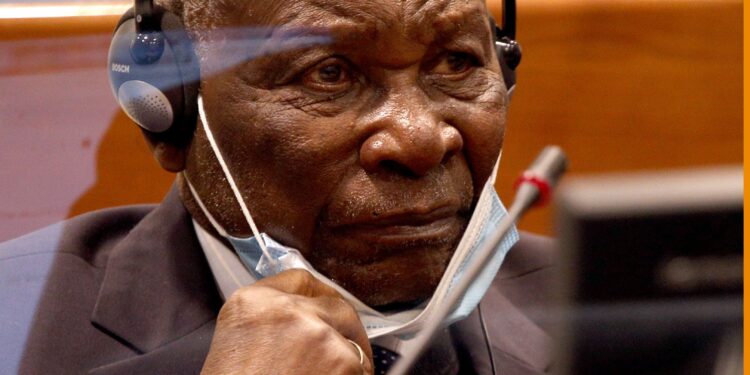François Ngirabatware and his sister, Catherine Mukakayange, have been denied access to their assets and bank accounts for 18 years because of their relationship to former fugitive Félicien Kabuga.
The two fell foul of the law on March 11, 2003, when the International Criminal Tribunal for Rwanda (ICTR) ordered the freezing of Ngirabatware’s and Mukakayange’s bank accounts in Brussels, Belgium, on suspicion that they could use the assets to help Kabuga evade capture. The court ruled that the Belgian government was obliged to cooperate with the ICTR and its prosecutor and that for as long as Kabuga was a fugitive, the funds should remain unavailable to the two.
At the time, Ngirabatware was a son-in-law of Kabuga, who has been accused of being a major financier of the Rwandan genocide of 1994, in which almost a million people were killed. In 1997, the ICTR indicted Kabuga of seven criminal counts, including genocide and crimes against humanity. He eluded capture for 26 years until May 16, 2020, when he was arrested in an apartment at Asnières-sur-Seine near Paris.
He is currently incarcerated at the United Nations Detention Unit in The Hague, awaiting trial at the International Residual Mechanism for Criminal Tribunals (IRMCT). The United Nations Security Council established the court on December 22, 2010 to continue the jurisdiction, rights, obligations, and essential functions of the International Criminal Tribunal for Rwanda and International Criminal Tribunal for the former Yugoslavia (ICTY) after the completion of their respective mandates
Ngirabatware and Mukakayange have filed a motion requesting the court to unfreeze their bank accounts, arguing that it no longer maintains an interest in freezing the accounts now that Kabuga has been arrested.
Journalists For Justice spoke to Peter Robinson, who is representing Ngirabatware and Mukakayange at IRMCT. He also represented the two before the ICTR. He once defended Radovan Karadžić, former president of the self-declared autonomous Bosnian Serb Republic, before the ICTY.
Journalists For Justice (JFJ): François Ngirabatware and his sister, Catherine Mukakayange, were hit hard by crimes they never committed. They were denied access to their bank accounts, apparently because François married the daughter of one of the world’s most wanted fugitives, Félicien Kabuga. Does this mean that if you are related to a fugitive, you are punished even if you have nothing to do with their crime?
Peter Robinson: The ICTR Prosecutor took the position that anyone related to Félicien Kabuga could possibly assist him to avoid capture and therefore if they had assets, they could be frozen. This sweeping generalisation is unfair and, in my view, illegal, but it was never tested in court at the ICTR.
JFJ: Individual criminal responsibility is a principle of international criminal law and involves a person who is most responsible for the crime, especially senior officials who cannot be tried in the national criminal justice system and are considered likely to manipulate the system. In this case, do you think the principle of individual criminal responsibility has been violated?
Robinson: I don’t think the principle of individual criminal responsibility was violated because they were not charged with committing any crimes. The way it was used at the ICTR instead violated the principle against guilt by association –since the only basis for freezing the assets was François’ association with Félicien Kabuga by having been married to one of his children
JFJ: Mr Ngirabatware and Ms Mukakayange spent years in court corridors and at the financial institution in efforts to obtain access to their funds. Two decades is a long time without access to a personal bank account. How has life been for them?
Robinson: This was a great injustice to them and plunged François into poverty for years. The account held the assets of his trucking business and he lost that business as well as his money. He has not recovered even now, some 18 years later.
JFJ: Mr Ngirabatware and Ms Mukakayange stated that they were the only proprietors of the accounts and Kabuga was neither the source of the accounts nor interested in them. Mr Ngirabatware declared in an affidavit dated April 12, 2021 that he married one of Kabuga’s children (Claudine Twagirihirwe) in 1995 and that they were now divorced. Do they have a right to claim compensation for the losses and damages they have suffered after the years in court trying to gain access to their accounts?
Robinson: There is no provision for claiming damages against the UN or ICTR. Even people who have been falsely imprisoned for years have been found to have no remedy. The banks and countries involved in freezing the accounts will say that all they did was follow orders from the ICTR. At this stage, the only remedy is to get the funds back.







